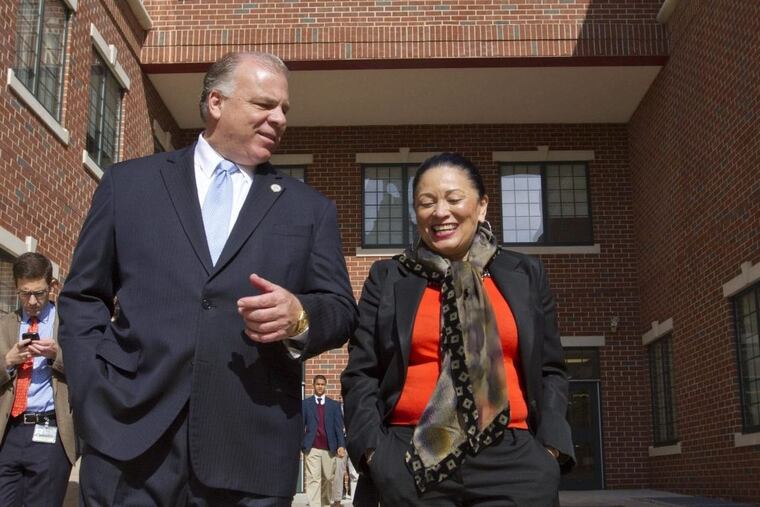Camden charter school accused of unfair enrollment practices
The city school district has expressed concerns about the enrollment practices at LEAP, Camden's oldest charter school, to the state Department of Education.

The Camden school district has accused the city's oldest charter school of unfair enrollment practices, alleging that the staff of LEAP Academy University discourages some parents from enrolling their children, while urging others to lie on applications in order to increase their child's chances at being selected.
The allegations were detailed in a letter obtained by the Inquirer that was sent to the Department of Education last week and signed by Paymon Rouhanifard, superintendent of the state-run district.
The letter was in response to a request earlier this year from LEAP to the state for permission to withdraw from Camden's citywide enrollment system, a program launched in 2015 that allows parents to apply to any school in the city by using one application.
LEAP's chief operations officer, Manuel Delgado, said in a statement to the Inquirer that LEAP had joined the enrollment system reluctantly because the school already had a strong enrollment base and a waiting list. He said the school's choice to withdraw was motivated by problems with the district's handling of transfer students, particularly that the system has made it much easier to transfer between schools mid-year.
"That results in higher drop-outs, mistrust in our school, and academic discontinuity," he said.
Participation in the citywide enrollment system is voluntary. Currently, all of the city's 39 public schools participate, including the city's new charter-public hybrid Renaissance schools.
The Camden school district declined to comment on the specifics outlined in the letter to the DOE, but spokeswoman Maita Soukup said in a statement that the district hopes LEAP will remain part of the enrollment system.
"We deeply value the partnership we've formed with charter and Renaissance schools to offer Camden families a simple, fair way to apply to any public school in the city," she said. "When any school pulls out of that system, it is our families and students who suffer."
According to the letter sent to the state, district officials believe LEAP's withdrawal would make it more difficult for parents to enroll their children in LEAP.
"Camden Enrollment ensures an independent effort that allows each and every student a shot at attending the public school of his or her choice," states the letter, which was addressed to Kimberley Harrington, the state commissioner of education. "… LEAP's desire to operate outside of the norms established by the common enrollment system indicates it is no longer willing to offer equal educational opportunities to all students, a prerequisite of running a public charter school in New Jersey."
The letter states that the district has received complaints from parents who said they were stonewalled when they tried to enroll their kids: that LEAP staff members failed to return phone calls or schedule appointments before the registration deadline.
Meanwhile, the letter states, two families told district officials that LEAP staff encouraged them to lie on applications in order to give them a better chance at being selected. Children with siblings attending LEAP are given preference over other students, and two families reported they were told to "list a current LEAP student as a sibling on their application, despite the school knowing that the attending student was not actually the applicant's sibling."
Delgado last week called those allegations "untrue and unfair."
"We are disappointed that, after making our intentions to withdraw from the universal enrollment process known, LEAP has been forced to defend itself against unfounded observations," he said.
Established in 1997, LEAP serves about 1,500 students in kindergarten through 12th grade. Its founder, Gloria Bonilla-Santiago, started the school with the mission of closing the achievement gap for Camden students and sending them to college well-prepared.
The school operates on an extended-day schedule and regularly touts strong academics, as well as a 100 percent rate for high school graduation and college enrollment. In recent years, college guidance counselors have encouraged students to apply for admission in dozens of colleges; in 2015, members of that year's graduating class applied to about 45 schools each.
LEAP has been criticized by some in the community who say the school's high graduation rate comes at the expense of attention to some of the city's neediest children, such as special-education students.
Delgado disputed that last week in his statement.
"Unlike Renaissance Schools, charter schools have to reach the entire city for its student enrollment and we have done this for 20 years," he said. "In our 20 years of operations, we have not turned away any student as a result of its special-education or ESL classification."
The Camden enrollment system was launched as a way of streamlining what had been a cumbersome process for parents. It replaced a complicated series of different applications and deadlines with a singular application and rolling deadlines over a period of months for all participating schools.
"In Camden, there have long been concerns that certain public schools aren't willing to serve our most vulnerable students, such as a student with an IEP [Individualized Education Program]," states the letter sent by the district to the state last week. "Camden Enrollment ensures an independent effort that allows each and every student a fair shot at attending the public school of his or her choice."
Many Camden parents lauded the changes, though some have feared the system will drive more families out of traditional public schools and into Camden's relatively new charter-public Renaissance schools.
In Newark, another state-run district, then-superintendent Cami Anderson's "One Newark" enrollment program led to complaints that the increased access created imbalance across the district, with students flocking to some schools while others emptied.